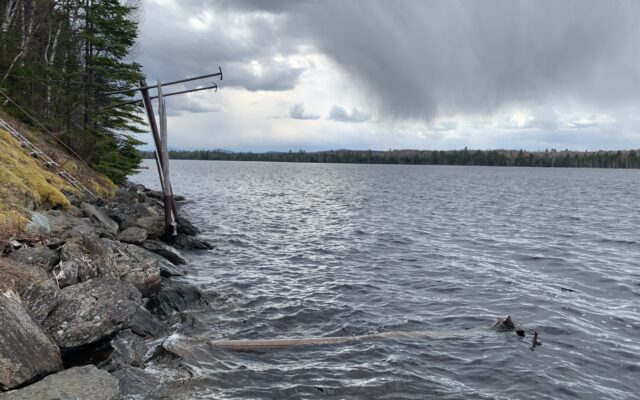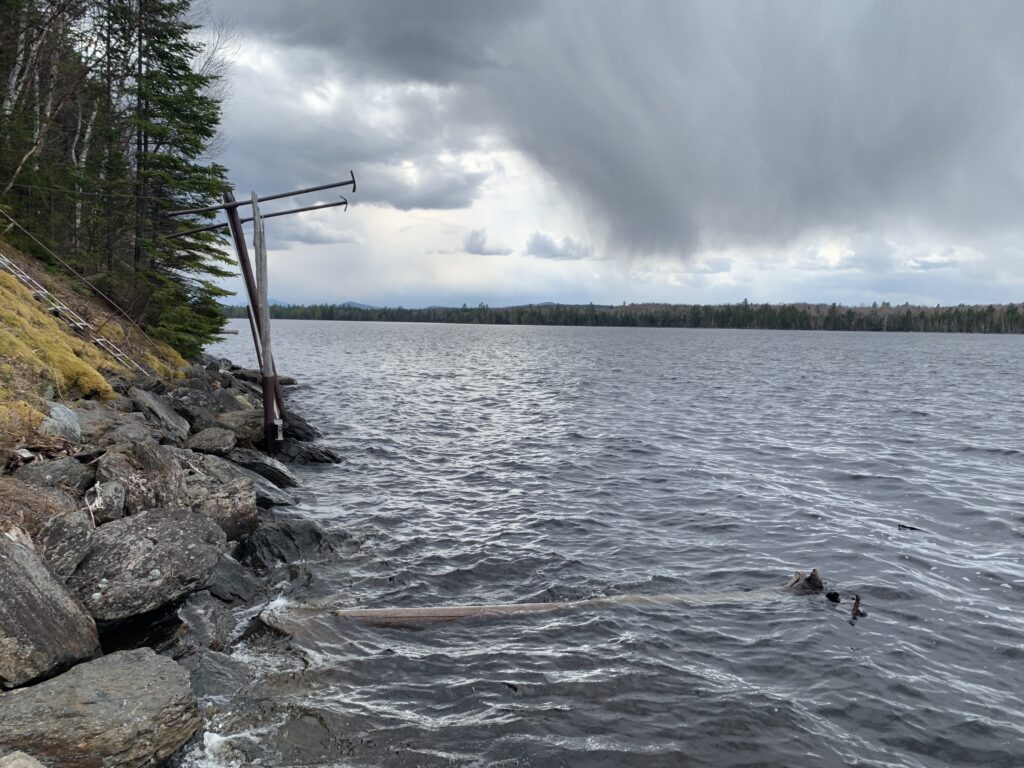
Anglers fear train derailment has damaged one of Maine’s most pristine areas
By Pete Warner, Bangor Daily News Staff
Rob Hannigan has been fishing at Brassua Lake his entire life.
His family has owned a camp there for years, and he has shared the spot with relatives and friends for countless fishing and hunting excursions.
That’s why Hannigan, who lives in Saco, was shocked to learn that diesel fuel was spilling into nearby waters after the April 15 derailment of a Canadian Pacific Kansas City Railway train in nearby Sandwich Academy Grant Township, located only a few miles away from his camp and right beside the lake, just west of Moosehead Lake near Rockwood.
“We spend a lot of time in that area. I certainly hope there’s no major, long-lasting impacts,” Hannigan said. “There’s some great salmon in there. The brook trout are in there and unfortunately there are a lot of bass now, too.”
An unknown amount of diesel fuel spilled into a stream after the derailment, according to the Maine Department of Environmental Protection, which criticized the railroad for its response. The train also was carrying two cars containing hazardous materials, but those remained intact.

BRASSUA LAKE — The water at Brassua Lake north of Rockwood appeared clear and the shore free of any evidence of a diesel fuel spill caused by an April 15 train derailment that occurred a few miles away at the mouth of the Moose River, a tributary of the lake.
The situation worsened when an additional 500 gallons of diesel spilled as the railroad tried to move the derailed locomotives without first pumping the fuel out of the saddle tanks. The Maine Forest Service and Land Use Planning Commission on Friday issued a joint notice of violation to the railroad because of sedimentation on the roads near the site.
Hannigan can’t help but worry how much fuel leaked into the stream next to the crash, which empties into the Moose River at the mouth of what is called Little Brassua Lake, the smaller section of Brassua at the west end of the lake.
The crash came amid increased scrutiny of rail safety after a recent high-profile and dangerous train derailment. But in the area around Moosehead Lake, local anglers and businesses are anxiously waiting to learn of any long-lasting harm to the water that is known as a haven for Maine’s most iconic fish.
State investigators are still probing the extent of the damage, including the amount of fuel that was spilled.
Hannigan is concerned that because there are few camps on the lake, the spill may not receive the attention it deserves.

CLEAN-UP EFFORTS — A front-end loader and a pile of rocks located at a railroad crossing on Route 15 in Taunton and Raynham Academy Grant, north of Rockwood, are part of clean-up efforts after the April 15 train derailment and diesel fuel spill that occurred a few miles away.
“We used to troll back and forth right there,” Hannigan said of targeting salmon and trout near the rivermouth. “That was always one of the go-to spots.”
Hannigan’s unease stems from knowledge of a 1991 train derailment in California, where 19,000 gallons of herbicide were spilled into the Sacramento River. It wiped out the fish and all other animals living in the water within 38 miles of the spill.
“My mind was drawn right back to the Sacramento River spill because of the geographic location of this, right at a river,” he said. “That’s my fear, is some devastating impact to the fishery, but I don’t know if we’re at that scale. Hopefully not.”
The diesel fuel spilled into a stream coming from the beaver flowage that empties into the waters at the mouth of the Moose River, which feeds directly into Brassua Lake. Contaminants could easily reach the lake.
“This is the time of year that you’re going to get your smelt run right there and the rest of the fishery kind of survives on that,” said Hannigan, who believes the fuel would likely move across the lake.
Photos of cleanup efforts on the water show numerous booms strung across the mouth of the stream to prevent the fuel from flowing into the river and the lake. Hannigan is curious how much fuel may have spilled before the booms were put in place.
Visible signs of oil or other debris in the water weren’t apparent on Thursday at a seasonal camp on the west shore of Brassua or the Brookfield Renewable dam at the east end of lake, where the water flows into renowned salmon and trout fishing grounds in the Moose River.
On April 28 Maine regulators said the railway violated environmental law by causing soil and rocks to slide into nearby waterways during the cleanup.
Angler and Registered Maine Guide Alan Harris of Hampden, who for many years has fished on the lower end of the Moose River that feeds directly into Moosehead Lake, hopes the area is not affected by the spill.
“What I’m worried about, depending on how much of that petroleum leaks through, is what it’s going to do to the habitat and the spawning,” said Harris, who remains optimistic. “I suspect that the threat to the river is miniscule.”
More than 30 miles down Route 15 in Greenville, a local resident at Indian Hill Trading Post who declined to give his name said he was initially concerned about what substances had leaked into the water. Once it was identified as diesel fuel, he felt it could be contained to avoid harming fish, wildlife and the environment.
Diesel fuel evaporates quickly if exposed to sun and air, compared with other oils. But it can float on top of water and contaminate fish and coat birds, and can also linger in soil and sediment and harm the worms and shellfish that live on the bottom of freshwater lakes, according to the California Department of Fish and Game.
Greenville is no stranger to train derailments, incurring four within the span of a year in 1998 and 1999. Six cars from a Canadian American Railroad train, some carrying butane, left the tracks near the Greenville cemetery in October 1998.
One Greenville business operator, who asked not to be identified, remembered townspeople smelling gas and fearing a possible explosion.
The Feb. 3 derailment in East Palestine, Ohio, of a Norfolk Southern train carrying vinyl chloride and other toxic chemicals ignited a fire that forced nearby residents to evacuate their homes and killed more than 43,000 fish and animals in the area. The U.S. Environmental Protection Agency is investigating the derailment.
A Canadian Pacific train also derailed in October in the Piscataquis County town of Orneville. Three engines and six cars left the tracks, spilling what was described as a small amount of diesel fuel.
In spite of the uncertainty, people living in the Moosehead Lake region are thankful that no one was hurt in the crash and that none of the hazardous chemicals on board were released into the environment. They have also been impressed with the number of people brought in to assist with the cleanup and restoration efforts.
They described a seemingly endless parade of dump trucks, flatbeds, tractors, pickup trucks and other vehicles, packed with equipment, streaming up Route 15 to access the crash site.
“It’s been intense,” said Sherrie Harmon, the manager at Rockwood Bar and Grill on Route 15. “I don’t think that I have ever seen so many vehicles come through Rockwood, on a Saturday, in the middle of mud season.”